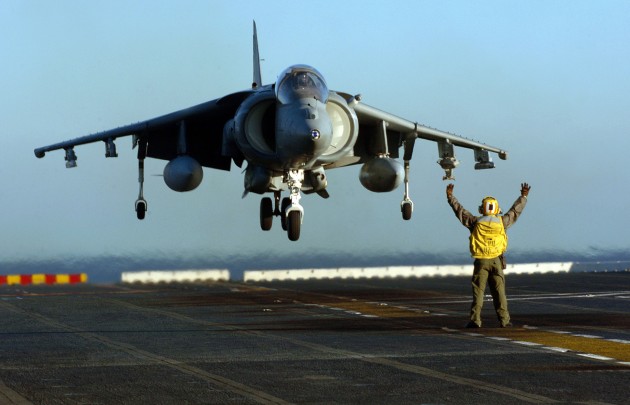US Bombs Australia’s Reef, Sort Of; Awkward For Pacific Strategy
Posted on

A Marine Corps AV-8B Harrier like those that jettisoned two bombs near Australia’s Great Barrier Reef.
[updated Wednesday 11:15 am] Yes, it is a bad idea to drop bombs on a World Heritage site, even when they aren’t armed to explode. But it’s arguably better than dropping the bombs on people.
Australians are understandably upset after US Marine Corps AV-8B Harriers, participating in a joint US-Australian exercise called Talisman Saber, jettisoned two bombs into the waters of the Great Barrier Reef. [Clarification: They also dropped two inert practice bombs that didn’t contain any actual explosive].The pilots made sure not to arm the bombs, so they did not go off and probably never will, but that’s still a lot of undetonated explosive uncomfortably close to a lot of marine life.
So why did the Americans do this? To avoid endangering human lives. The US fighters were supposed to drop their bombs as part of the training exercise, but the designated bomb range — actually just a specified area of water — turned out to have unauthorized civilians in it: “There were civilian boats right underneath them,” said a US Navy spokesman, Commander Williams Marks.
For obvious safety reasons, naval airplanes generally do not land back on their ship — in this case the amphibious warship USS Bonhomme RIchard — with live bombs still under their wings. So they followed standard procedure and jettisoned the bombs into the water. The original plan had been to drop well away from the Great Barrier Reef, but for some reason the Harriers — geriatric jump jets due for replacement by the new F-35B — didn’t have enough fuel to make it to the designated jettison area and get home. So it was hardly an inspiring moment in military history, but it wasn’t a war crime, either.
Naturally Australian environmentalists and pacifists didn’t see it that way. “Have we gone completely mad?” asked Green Party legislator Larissa Waters — who was conveniently on hand to comment because she was already protesting the military exercises on principle before anything actually went wrong. “Is this how we protect our World Heritage area now,” she fumed, “letting a foreign power drop bombs on it?”
It’s important to note that the Greens are the furthest left of Australia’s major parties. They are also part of Australia’s current coalition government with the dominant Labour Party. Elections are expected this fall and the Labour Party, under its new leader Kevin Rudd, is struggling to shed the unfavorable view many Australians had developed of Prime MInister Julia Gillard.
Since the US has been one of Australia’s closest allies since 1941, Waters’ saying “foreign power” seems a bit harsh, but the damage is done — to America’s image, if not actually to the Reef. US and Australian officials quickly went on the offensive to insist the bombs were no threat to life, human, animal, or coral. Both countries have been working hard in recent years to bolster their longstanding alliance — a pillar of the Obama administration’s “pivot” to the Pacific and keeping an eye on China, a strategy that includes a growing Marine Corps presence in Darwin, Australia. Ironically, the ongoing exercises are supposed to bring the two countries closer together.
[Updated Wednesday 11:15 am: An Australian website is reporting that the bombs will be retrieved from the water by a mine warfare ship, although it’s yet to be determined whether it’ll be a US Navy Avenger-class mine countermeasures ship or a Royal Australian Navy Huon-class coastal minehunter].
CORRECTED 4:45 pm Tuesday to remove the word “live” from the description of the two bombs, as they were unarmed, and to clarify that two inert practice bombs (which do not contain explosive) were also dropped.
Subscribe to our newsletter
Promotions, new products and sales. Directly to your inbox.
